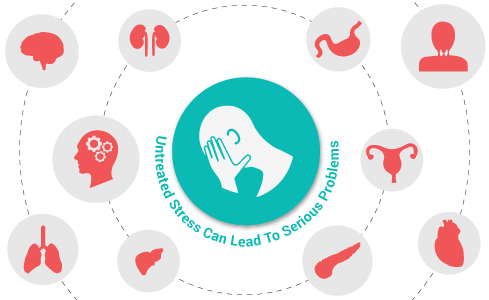In this competitive and emotionally vulnerable world, stress is now becoming an integral part of life. Continuous stress without relief or relaxation is observed as distress by medical science and it can have numerous negative effects on your body.

1. Psychiatric problems: Maximum effect of chronic stress is seen at the mental well-being of a person and can cause disorders like depression, anxiety, and irritability. Behavioural disorders like insomnia, bulimia, or anorexia are also common in stressed people. Serious psychological complications may include suicidal thoughts and the development of self-harm tendency. Prolonged stress may also lead to drug abuse and alcoholism.
2. Endocrine system: Stress has been established as an important causative factor for many metabolic disorders like thyroid disorders, diabetes, and high cholesterol. Stress can have huge effects on sexual hormones of females and can alter their menstrual cycles as well as fertility and libido.
3. Cardiovascular and respiratory problems: Stress has been found to be associated with heart disorders like angina, high blood pressure and increased incidences of heart attack. Stress is also a potent trigger for asthmatic attack in chronic patients.
4. Other effects: Other effects of stress include increased vulnerability to infections, digestive problems and muscular pains. Headaches and migraine attack are very common in distressed people.
Considering the negative effects of stress, one must start to manage stress at its initial levels only. Proper time management, yoga, and meditation are important stress management tools. One must not hesitate to consult a psychiatrist if they find stress to be overwhelming.






